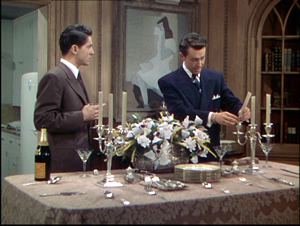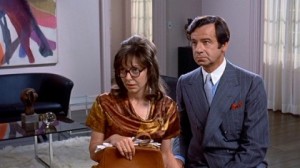Here’s what I blogged a year and eight days ago:
A funny thing happened on the way to the theater yesterday afternoon. I was sitting at my desk, sending one last e-mail before I departed for a Fringe Festival performance of a musical about Robert Blake, when the lights quivered, dimmed, and died. Figuring the power on my Upper West Side block had gone out, I put my shoes on, walked downstairs in the dark, caught a cab…and realized by the time we’d gone 20 blocks that it wasn’t just my neighborhood. Assuming that there wouldn’t be any shows to see that day, I told the cabby to turn around.
Eighteen hours later, here I am, very sweaty and insufficiently slept but otherwise none the worse for wear. The power’s back on in my neighborhood, some of the restaurants are open, and I’m in the process of figuring out what to do next….
I never did get around to seeing that musical about Robert Blake. Instead, I took refuge in a neighbor’s apartment, not caring to be alone, and spent the night listening to a wind-up radio and sweating. Had it not been so hot, it would have been fun. Like most New Yorkers trapped in the blackout of 2003, I’d briefly feared that 9/11 was repeating itself, and once I knew it wasn’t, I was so relieved that nothing else mattered.
A year later, I find myself doing much the same thing, minus the flashlights and candles. I’m sitting at the same desk, clicking away at my iBook and putting into order my first impressions of the five plays I just finished seeing at the New York International Fringe Festival. I’ll be reviewing those plays, and three others, in this Friday’s Wall Street Journal, so I mustn’t jump the gun, but I can say that I got quite a bit of pleasure out of my weekend of nonstop playgoing. Unlike last year, the weather in Manhattan has been intermittently temperate, though I did come close to smothering once or twice, few places in the world being less pleasant than a black-box theater without air conditioning on a humid August day. I got caught in a cloudburst on Saturday afternoon–but I don’t mind getting wet. I had to trudge up six flights of steep, slippery stairs to see one show–but I didn’t fall, and in any case I needed the exercise. Most of the seats in which I sat were variously uncomfortable–but there’s nothing like a good show to make you forget a bad seat.
Truth to tell, I love the Fringe Festival, even when it’s not so good. Seeing live actors in a small theater performing a new play by a writer about whom you know nothing can be one of the most exhilarating experiences imaginable. It can also be unutterably tedious, but my batting average so far has been excellent. Either I’m just lucky, or I’m starting to get the hang of picking Fringe shows (I endured a couple of stinkers last year).
I’ve been doing more than perching myself on folding chairs in black-box theaters. Last night, for instance, I went to the Jazz Standard, my favorite New York nightclub, to hear Gene Bertoncini and Michael Moore, who for many years were the best working guitar-bass duo in jazz. Back in the Eighties, they were all but joined at the hip. You could hear them most Sundays at a now-defunct, much-lamented Italian restaurant called Zinno, and they cut a number of first-rate CDs as well. Alas, Bertoncini and Moore called it quits in 1989–Whitney Balliett wrote a lovely New Yorker essay about their decision to part–and though the separation was perfectly friendly, it’s been years since they last played together in a New York club.
Not surprisingly, the Jazz Standard was crawling with musicians all weekend long, it being that kind of place, comfortable and welcoming. (Among those present on Sunday were Peter Washington, Bill Charlap‘s indispensable bassist, and Luciana Souza, who needs no introduction to regular readers of “About Last Night.”) Musicians usually play especially well for their peers, and Bertoncini and Moore obliged with a vengeance, kicking off the first set with a medium-tempo version of Neal Hefti’s “Li’l Darlin'” that swung like the whole Count Basie band rolled into two.
After the set was over, I climbed the stairs to the street and walked a few blocks before hailing a cab, accompanied by two musician friends in no more of a hurry to get home than I was. We headed up Fifth Avenue, refreshed by the unexpectedly cool night air, and gazed with delight at the Empire State Building, whose upper stories were brilliantly lit in green and white in honor of the independence of Pakistan, those being the colors of the Pakistani flag. As we strolled past the shuttered storefronts, looking for all the world like the three happy sailors of On the Town, I remembered a conversation I’d had earlier in the day with another friend. We’d seen a Fringe matinee, then taken high tea at Tea and Sympathy and done some window shopping in Greenwich Village.
“This is absolutely the only place to live,” I told her. “Nowhere else.”
“Oh, I guess it’s all right to visit other places,” she replied. “And you could live somewhere else for six months, if you had to. Or maybe even a year.”
“But only if you don’t give up your lease,” I said firmly.
We giggled, knowing perfectly well that neither one of us had the slightest intention of going anywhere else for more than a week or two.
Were we being heedless? As I thought of our exchange, a familiar stanza that acquired ominous new overtones not so long ago popped unbidden into my head:
Faces along the bar
Cling to their average day:
The lights must never go out,
The music must always play,
All the conventions conspire
To make this fort assume
The furniture of home;
Lest we should see where we are,
Lost in a haunted wood,
Children afraid of the night
Who have never been happy or good.
But I shook it off, knowing that I was neither unhappy nor afraid of the cool, clear night. Instead, I was glad to be exactly where I was, living my life instead of waiting for it to begin. I still am. So long as the lights stay on and the music keeps playing, this–right here, right now–is home.

 I’ve seen most of Alfred Hitchcock’s major films, but for some reason
I’ve seen most of Alfred Hitchcock’s major films, but for some reason 